More than 50 polar bears descend on Russian village, frightening locals
The animals came to the village in search of food, conservationists said.
LONDON and MOSCOW -- More than 50 polar bears have descended on a Russian village looking for food, conservationists said.
In total 56 polar bears were counted by a patrol near the village of Ryrkaypiy on Kozhevnikov Cape in Russia’s far north over a period of four days, according to the World Wide Fund for Nature (WWF).
Although polar bears on the cape are a common occurrence in the area, the size of the gathering is “unusual,” according to WWF, which said the animals most likely came to the village in search of food.
“Almost all the bears are thin,” Tatyana Minenko, the head of Bear Patrol in Ryrkaypiy, said. “There are both adult and young animals, including cubs of different ages with their moms.”

The environmentalists took pictures of the bears, which can be seen eating walrus carcasses in the freezing cold.
The local Bear Patrol is now monitoring the bears’ movements and inspecting the surrounding area on snowmobiles to stop the bears from entering the main area of the village. The bear invasion has led authorities to deploy special buses to take children to school safely.
Polar bears are increasingly entering human settlements due to the decline of the sea ice, meaning they are forced to go ashore in search of food, the WWF said.

"If there is enough ice, the bears would go further north to hunt the seals,” Mikhail Stishov, Arctic biodiversity projects coordinator for the WWF in Russia, said. “Until the ice is not thick enough, they will stay ashore and can visit the village due to curiosity and hunger. Spontaneous waste deposits can attract the animals: bears will go for the smell of food waste, regardless of the availability of other food.”
“Gathering of polar bears are becoming more frequent, and we have to adapt and find ways to avoid conflicts between people and animals," he added.

The incident follows a similar polar bear invasion earlier this year, when authorities in the remote region of Novaya Zemlya were forced to declare a state of emergency when hungry polar bears entered several villages.
Olga Filatova, a local resident, told ABC News that it was “frightening” for villagers as the number of bears is far higher than in previous years.
Vladimir Krever, the biodiversity program leader for WWF Russia, told ABC News that the bears "are pulling dead walruses out of the village. So far there are no accidents. But bears are potentially dangerous and when they are hungry they are potentially aggressive.”




